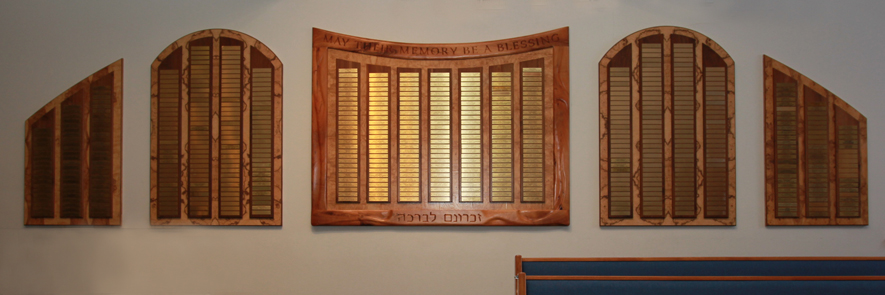
The time of death of a loved one can be overwhelming for families and friends. Please know that as part of the Temple Adat Elohim community, you will not be alone traveling the mourner’s path. While the following is meant to provide basic answers for your immediate concerns, our doors and arms are always open for further guidance, support and comfort.
Click here to view a live-streamed lifecycle event
Immediate Considerations
When death occurs at home, call 911. If the deceased was under hospice care, contact the hospice. If the deceased was in a hospital, the hospital staff will make the necessary arrangements.
Call the Temple
Please call the Temple as soon as possible: 805-497-7101. If you are unable to speak with someone during business hours, choose option 1 during the “welcome message”. This will give you the phone number of the clergy “on call”. One of our clergy leaders is always “on call”. However, if you receive their answering message or relay operator, please leave a detailed message and they will be in contact with you as soon as possible. Even if the deceased is not in the local area, we encourage you to call so that we respond with support and comfort.
Call a Mortuary
- Mt. Sinai Memorial Parks and Mortuaries (Simi Valley): 800-600-0076
- Pierce Brothers Valley Oaks (Westlake Village): 818-889-0902
- Arrangements may be made through the Temple for the purchase of a burial plot at either of these locations. Please contact the temple office for more information.
- A memorial service may be held at a cemetery, a private home, or the TAE sanctuary.
- One of our clergy will be available to officiate at a funeral service for members of TAE and their immediate family.
- Please consult with one of our clergy before setting a time for the funeral service.
Organ Donation
Organ donation is considered a mitzvah (sacred obligation). For more background please visit the Reform Movement’s Organ Donation Information.
Cremation
In Jewish tradition, burial has long been the time-honored and normative practice for honoring our dead. At the same time, we recognize that in our own day, some of our loved ones may request cremation. We affirm that our role is to honor the dignity of the deceased and to offer comfort and support to the bereaved. When a family chooses cremation, we accompany them with compassion, provide the appropriate prayers and rites, and ensure that the remains are treated with reverence.
The Casket and Other Preparations
In keeping with tradition, caskets for a Jewish burial are of simple wood construction and remain closed prior to and through the duration of the service.
A chevra kadisha (burial society) may be requested through the mortuary or by contacting The Valley Chevra Kadisha at 818-287-6155. For more information on the role of the chevra kadisha, please speak with one of our clergy.
Embalming and autopsies are discouraged. However, state and local laws take precedence over Jewish laws and customs.
Interfaith Questions
Our clergy are available to conduct a funeral or memorial service for a family member even if the deceased was not Jewish. The service may be appropriately modified in consultation with the clergy to reflect the unique needs of the family.
We also encourage our families to follow the path of mourning for non-Jewish family members. For guidance, please see the information below or consult with one of our clergy.
Read More About our Interfaith Customs
Funerals and The Path of Mourning
Timing
Funerals are held as soon as possible. The traditional view is that the funeral is within 24 hours of the time of death with delays acceptable to accommodate out-of-town relatives and friends. Cemeteries have limitations for the number of burials they can accommodate per day. These factors may delay funerals. Every effort will be to work with you to conduct the funeral as soon as possible. Funerals are not conducted on Shabbat (Saturday) or on Jewish holy days.
Shivah
Immediately following the service at the cemetery, guests visit the family at their home to pay their respects. Members of our Sisterhood often participate in the mitzvah of kavod ha’met (the sacred obligation to show respect for the deceased) by preparing the home for the family’s return from the cemetery. Please let us know if you would like the Sisterhood to prepare your home.
It is considered a mitzvah (a sacred obligation) to sit “shivah” for seven days after the loss of a parent, spouse, child and sibling. Shivah traditionally consists of reciting the kaddish (memorial prayer) and refraining from daily activities and business pursuits. Each night, a member of the TAE clergy or a fellow-congregant will be available to lead a short service at your home. Typically, members of our congregation “sit shivah” for 2 or 3 days. However, we would be honored to lead a service each night of the first week of mourning. If a minyan (a quorum of 10 Jewish adults) is not expected, we can also arrange to have congregants join you in your house of mourning. Mourners recite kaddish with the congregation at the Temple on Shabbat (Friday night and Saturday morning) and then resume shivah on Saturday night.
Your loved one’s name is recited at the Temple on Friday night for 30 days.
Shloshim
Shloshim is the balance of the 30 day mourning period following shivah. During this time the mourners return to most of their daily activities but often refrain from social events. At the end of shloshim, the mitzvah (sacred obligation) to recite kaddish daily only continues for those mourning the loss of a parent.
First Eleven Months
For the first eleven months, the mourners kaddish is recited by a loved one at each service they attend. At our Shabbat services, mourners in the period will be asked to rise and say the name of the person for whom they are reciting kaddish.
Yahrzeit
The yahrzeit is the anniversary of the death. It is customary to light a 24 hour yahrtzeit candle at sunset the day before the anniversary date. Members of our congregation choose to observe either the Jewish or secular date of the yahrzeit. The name of the deceased is read in the synagogue on Friday night of the yahrzeit and typically the mourner chooses to honor the memory of the deceased with a contribution to the synagogue. If you wish to have the name of your loved one read on a different date, please call our office.
Unveiling
The unveiling and dedication of the grave marker is usually in the 11th month of mourning. This brief ceremony may be conducted by a member of our clergy, a family member, or friend.
Yizkor Services
Four times each year the Temple conducts a special memorial service: Yom Kippur, Sukkot, Passover and Shavuot. We encourage you to make a special effort to attend these services each year.
Mourning the Loss of Friends and Non-Immediate Family
While there is no obligation to formally mourn for those who are not in our immediate family, we certainly grieve for the loss of close friends and extended family members. Please contact our clergy for guidance and support if you are experiencing such a loss.
